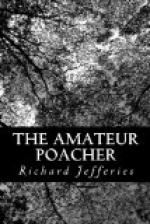It was too far for a safe shot; in a minute he went down into the meadow on the other side. I then crept on hands and knees towards the nut-bushes: as I got nearer there was a slight rustle and a low hiss in the grass, and I had to pause while a snake went by hastening for the ditch. A few moments afterwards, being close to the hedge, I rose partly up, and looked carefully over the fence between the hazel wands. There was the pheasant not fifteen yards away, his back somewhat towards me, and quietly questing about.
In lifting the gun I had to push aside a bough—the empty hoods, from which a bunch of brown nuts had fallen, rested against the barrel as I looked along it. I aimed at the head—knowing that it would mean instant death, and would also avoid shattering the bird at so short a range; besides which there would be fewer scattered feathers to collect and thrust out of sight into a rabbit bury. A reason why people frequently miss pheasants in cover-shooting, despite of their size, is because they look at the body, the wings, and the tail. But if they looked only at the head, and thought of that, very few would escape. My finger felt the trigger, and the least increase of pressure would have been fatal; but in the act I hesitated, dropped the barrel, and watched the beautiful bird.
That watching so often stayed the shot that at last it grew to be a habit: the mere simple pleasure of seeing birds and animals, when they were quite unconscious that they were observed, being too great to be spoilt by the discharge. After carefully getting a wire over a jack; after waiting in a tree till a hare came along; after sitting in a mound till the partridges began to run together to roost; in the end the wire or gun remained unused. The same feeling has equally checked my hand in legitimate shooting: time after time I have flushed partridges without firing, and have let the hare bound over the furrow free.
I have entered many woods just for the pleasure of creeping through the brake and the thickets. Destruction in itself was not the motive; it was an overpowering instinct for woods and fields. Yet woods and fields lose half their interest without a gun—I like the power to shoot, even though I may not use it. The very perfection of our modern guns is to me one of their drawbacks: the use of them is so easy and so certain of effect that it takes away the romance of sport.
There could be no greater pleasure to me than to wander with a matchlock through one of the great forests or wild tracts that still remain in England. A hare a day, a brace of partridges, or a wild duck would be ample in the way of actual shooting. The weapon itself, whether matchlock, wheel-lock, or even a cross-bow, would be a delight. Some of the antique wheel-lock guns are really beautiful specimens of design. The old powder-horns are often gems of workmanship—hunting scenes cut out in ivory, and the minutest detail of hoof or antler rendered with life-like accuracy. How pleasant these carvings feel to the fingers! It is delightful to handle such weapons and such implements.




